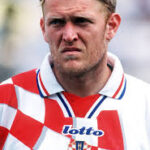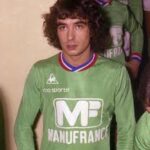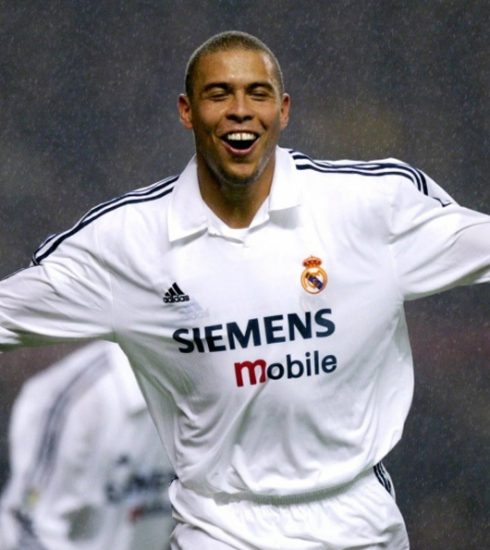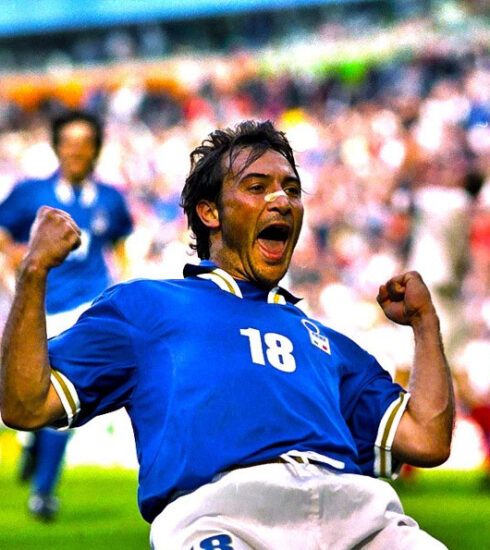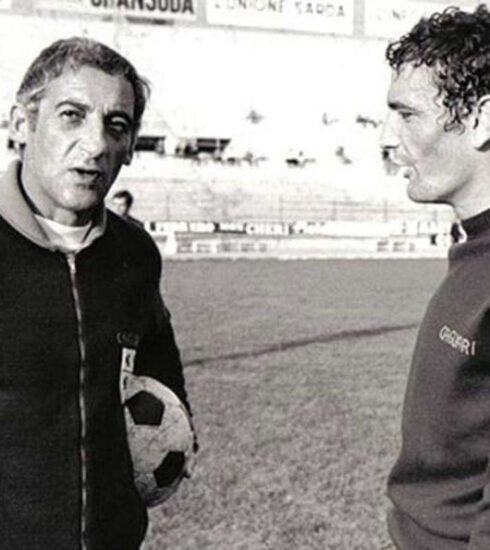DOMINIQUE ROCHETEAU: The heart and soul of Saint Etienne



He was different from everyone else.
On the pitch and off.
He would arrive in his ‘Volkswagen Beetle’ and if you didn’t know him you might well think he was a student coming to the Geoffrey-Guichard to watch the game.
Long curly hair, blue jeans, shirt and jumper.
This was the height of his elegance.
On the back seats of his ‘Volkswagen Beetle’ books and records everywhere.
And not trivial stuff!
Sartre, Bakunin, Kundera and Fitzgerald and Pink Floyd, Genesis and Yes.
Social and political commitment.
One of the ‘gauche’ but without any party affiliation.
One who preferred the taverns of Saint Etienne to trendy clubs and who preferred the tranquillity of the countryside instead of the Côte d’Azur, Biarritz or Chamonix.
Always polite, kind and smiling.
In short, if there was an archetype of the anti-devil, it was DOMINIQUE ROCHETEAU.
Then he would put on his boots, shorts and his green jersey with the number 7 and he would literally transform.
A crazy energy, an infectious enthusiasm for his teammates and for us in the stands.
For a 15-year-old kid like me, it was easy to turn him into your idol.
When he took to the pitch at speed with the ball at the foot, jumping over opponents like skittles, he was a joy to behold.
But there was more to him than technique and speed.
Those are natural gifts that if you possess them you have your parents or someone up there to thank.
Dominique Rocheteau had something else.
Dominique Rocheteau fought like a lion.
Something few talented players do, waiting for other, less talented teammates to pull the chestnuts out of the fire before he got the ball between his feet.
On the other hand, when he lost the ball he was capable of chasing his opponent for dozens of metres, trying to take back what was his.
The beginnings were by no means easy.
That he was strong we all knew at Saint Etienne.
The problem was that for two consecutive seasons after moving from the youth teams to the first team, seeing him play two consecutive games seemed an impossible feat.
When we won the championship in 1974 and then again the following year, Rocheteau was little more than an extra.
When it wasn’t his fragile knees there was always some muscle trouble to keep him out.
Some were resigned among our fans.
‘Too fragile and delicate’ was being said in the stands of our hot stadium.
Someone was advising him to squeeze less in his defensive runs and someone else was advising him to pass the ball earlier and more often to avoid being kicked by defenders.
‘I only know how to play like this,’ Rocheteau repeated to everyone and on all occasions.
Then came the 1975-1976 season.
He had gone through the entire preparation without a hitch and those who had seen him in action in the first friendlies spoke of him as ‘a new player, never seen before’.
In the first matches he had already shown excellent things.
Dizzying plays, dribbling and a few fine assists.
But it was on 27 August, in the fourth game of the championship, that we realised we had finally found the last piece of the puzzle to complete a team that was already of the highest level.
That day we played at home against the Girondins de Bordeaux and Dominique Rocheteau was simply outstanding. We won 5-2.
Dominique scored one goal but played a leading role in all the team’s other goals.
That season, injuries finally started to give him a break and now going to the Geoffrey-Guichard had become even more fun.
A solid, concrete and organised team now also had that touch of imagination and unpredictability that finally allowed us to make a difference in Europe too.
It was an unforgettable season.
Not only for St. Etienne but for all of French football.
A club team that was returning to the top of European football after many, too many years of lean cows.
That year in the European Cup we eliminated Copenhagen and immediately afterwards the fearsome Scots of Glasgow Rangers.
I must admit that when the draw in the quarter-finals pitted us against Dynamo Kiev Soviets, I thought we had reached the end of the line.
They had won the Cup Winners’ Cup the year before and had a real squad.
Blokhin, Veremeev, Onischenko … all great players in a team that moved with perfect mechanisms.
Many considered them the favourites for the final victory.
The first leg in Kiev fully confirmed our fears.
Two-nil to Dynamo and let’s face it … if it had been four or five we could not have complained.
The day of the return match arrived.
17 March 1976.
At fifteen it is easier to believe in miracles.
Life has not yet presented you with the bill for the mediocrity so many of us have to live with. I believed in it, my friends with me.
It wasn’t just an exercise in self-belief… we really believed it!
When we arrived at the stadium, we realised that we were not as alone as we thought.
Our Geoffrey-Guichard looked like Liverpool’s Anfield Road.
38,000 spectators filled every sector of the stadium.
Choirs, flags and a passion like I had never seen before in my life.
We had decided that if we were going to get out of the Champions Cup we were going to do it in a big way.
The boys in the green jerseys left their hearts on the pitch and we left our throats in the stands.
The start was far from exciting.
Driven by the atmosphere and the desire to make history, captain Larqué and his teammates tried to attack the Soviets … soon discovering that their ability to hold the ball and lunge with deadly changes of pace could have been fatal to us.
Patience was needed and, as always in such cases, a little luck too.
Almost twenty minutes have passed since the start of the second half and the result is still nailed on 0-0.
We are attacking en masse when we lose a ball in the opponent’s three-quarter.
Oleg Blokhin, the fantastic Dynamo Kiev winger and reigning ‘Ballon d’Or’, gets hold of the ball. He starts with the ball at the foot from his own half of the field, jumping over two of our defenders with ridiculous ease.
He presents himself alone in front of Curkovic.
He is in the penalty area with two clear chances to put his team ahead and effectively end the qualifying discussion.
To shoot on goal with his powerful left foot or to tip the ball to teammate Veremeev in an even better position.
Blokhin, much to our good fortune, chooses a third.
He waits for the return of our defender Lopez, pretends to shoot to avoid even the last desperate intervention of our Argentine defender.
Lopez is not fooled. He stays on his feet and perfectly steals the ball from the feet of the Soviet number 11.
On his rebound, first Piazza and then Larqué lengthen the trajectory until the ball reaches the Dynamo Kiev penalty area.
The Soviet defenders are surprised by this sudden turnaround.
The ball is lifted into the box and the quickest is our centre forward, Hervé Revelli, who with a precise diagonal touch puts the ball into the net.
Exactly twelve seconds had passed since Lopez’s decisive tackle on Blokhin.
Now the Geoffrey-Guichard was a veritable bedlam.
Only seven minutes passed and, again for a foul on Hervé Revelli, we were awarded a free kick on the edge of the area.
Jean-Michel Larqué is a specialist and the position is absolutely inviting.
His violent right-footer left Dynamo goalkeeper Rudakov no chance.
We’re even.
Who would have thought?
Dynamo Kiev is strong, really strong.
The Soviets do not lose their heads and their compactness in the mad cauldron that has become our stadium is truly admirable.
Dominique Rocheteau has repeatedly put the Soviet rearguard in apprehension but has so far failed to make an impact.
At the start of the first overtime period, however, all 38,000 spectators at the Geoffrey-Guichard stadium held their breath: our number 7 began to limp conspicuously.
Our coach Herbin had already made both changes allowed by the rules.
Rocheteau remains on the pitch but it is clear that his contribution is not the usual one.
It is only to be hoped that the 120th minute arrives quickly so that we can then play on penalties for passage to the semi-finals.
Less than six minutes to go when Santini tried to break through on the right. The other newcomer Patrick Revelli launches himself deep to dictate the pass, which arrives on time.
In front of him there is a Dynamo defender to close the way.
Double feint to conquer the back line. Patrick Revelli lengthens his stride and just before the ball leaves the ground he manages to put a low cross towards the centre of the area.
There stood Dominique Rocheteau who, almost walking, had followed his team-mate’s action.
The ball lands on his right.
He is completely alone.
His volley ends up in the back of the net.
Three-nil. It’s the qualifying goal.
Dominique Rocheteau became the idol of the whole of Saint Etienne and much of France.
We are in the semi-finals, among the top four strongest teams on the continent.
Continuing to dream is not so difficult …
Saint Etienne will face the Dutch PSV Eindhoven in the semi-finals. It was to be two tight games, decided by another shot from captain Larqué’s free-kick and Ivan Curkovic’s sensational saves in the return match, which AS finished 0-0 to qualify for the final against Bayern Munich.
Dominique Rocheteau injured his knee in that return match.
It will be a race against time to get him fit to play in the final against Bayern Munich.
Thanks to an infiltration of Novocaine, ‘l’ange verte’ (a nickname Rocheteau hates with all his might) at least manages to go on the bench.
It was to be a one-sided game that Saint Etienne dominated from start to finish after going into a disadvantage at the start of the second half on a free kick by German midfielder Roth.
Only the German goalposts and Sepp Maier’s extraordinary saves allowed the Germans to keep their goal inviolate.
With seven minutes to go, Robert Herbin played his last card.
Dominique Rocheteau, with a conspicuous bandage on his knee, entered the field.
It was to be an incredible seven minutes where the 21-year-old French striker repeatedly embarrassed the German defence by offering his team-mates a couple of golden balls.
There was nothing to be done.
The Germans would lift the trophy of Europe’s most prestigious competition for the third consecutive time … and for the third time thanking Lady Luck who was always shamelessly on their side.
In the following season came the conquest of the French Cup, but from the 1978-1979 season, a radical change came for the club.
Instead of continuing to develop the players from the nursery, important purchases arrived on the market.
First it would be the turn of Larios, Zimako and Lacombe.
It will be a sensational season for Rocheteau.
As many as 21 goals and 12 assists will sanction his decisive consecration.
In the championship, however, only a third place came.
Too little for the habits of the ‘Verts’ accustomed to the series triumphs of previous seasons.
In the summer of 1979 two more great players arrived who would have the task of taking AS Saint Etienne back to the top of French and European football.
The accomplished Dutch striker Johnny Rep and the young French football phenomenon Michel Platini.
Rocheteau started the season strongly but then an injury, yet another, left him in the pits for almost the entire season.
When he returned, AS Saint Etienne seemed to be able to do without him.
Robert Herbin always holds him in high regard but Rocheteau is not happy.
Paris Saint-Germain came forward with a big offer.
They have to replace the great Argentine centre forward Carlos Bianchi and Rocheteau is offered the number 9 of the capital’s formation.
It is the decisive factor.
Rocheteau always loved that position, but first Revelli, then Lacombe and Rep always prevented him from playing in that role at Saint Etienne.
He stayed at PSG for seven seasons, scoring a total of 100 goals in 255 games. He is still fourth in the Parisian club’s goalscoring charts, preceded only by the Brazilian Pauleta, Zlatan Ibrahimovic and Edinson Cavani.
It was essentially his 19 league goals in the 1985-1986 season that allowed the Parisians to climb to the French roof for the first time that season.
It was to be Dominique Rocheteau’s swansong season and he would play one more season in Paris before ending his career with Toulouse FC in 1989 at the age of 34.
ANECDOTES AND CURIOSITIES
There is not a single Frenchman who is not absolutely convinced that with Dominique Rocheteau on the pitch from the first minute, Saint Etienne would have won the European Cup in the final against Bayern.
This view is also supported by a ‘gentleman’ such as Franz Beckenbauer who declared after the match that ‘I don’t know how the game would have ended but Rocheteau certainly drove us crazy in those seven minutes. Certainly to stop him for ninety would have been a feat”.
Saint Etienne contributed enormously to bringing interest in football back to French soil, which was still stuck with the national team’s third-place finish at the 1958 World Cup in Sweden.
On their return to France after the unfortunate final against Bayern, the ‘greens’ of Saint Etienne were received by French President Valéry Giscard d’Estaing at the Champs Elysées … in front of more than a hundred thousand people.
It was ‘Onze’ journalist Jean-Pierre Frimbois who first nicknamed Dominique Rocheteau ‘L’Ange vert’. A nickname hated viscerally by Rocheteau, but one that he carried with him throughout his years at Saint Etienne.
The beginning of his career was far from easy for the talented striker born in Saint Etienne.
In addition to constant muscle aches in April 1974, a penal code operation by Lyon defender Bernard Lhomme forced him to have a first knee operation that would keep him off the pitch until the following autumn. When he returned, he was unable to play consistently and even considered giving up football. There is oyster farming with his father as an alternative.
Dominique Rocheteau held out and in the 1975-1976 season came his first great satisfaction.
His start that season was so amazing that French national team selector Stefan Kovacs called him into the national team before he even started his first real championship with AS Saint Etienne.
In a pre-season match between Saint Etienne and English side Leeds United, Kovacs is in the stands to watch the match.
Rocheteau was on the pitch and scored two goals after putting the very strong English team to the sword, who a few months earlier had played, and lost, the European Cup final against Bayern Munich at the Parc des Princes.
At the end of the match Kovacs goes to the locker room and turns to Rocheteau and says ‘see you in the national team young man!
It seems like a joke or at least a witty way of congratulating the young ‘Verts’ striker.
Instead, the following week Dominique Rocheteau was called up for a friendly match between France and Juanito and Santillana’s Real Madrid.
… and in that match, too, Rocheteau scored a brace, literally making Real Madrid’s strong left-back Antonio Camacho suffer.
With the French national team Rocheteau would play 49 matches, scoring 15 goals and also taking the satisfaction of being the only French player besides Michel Platini to have scored in three different World Cups: Argentina 1978, Spain 1982 and Mexico 1986.
In a nonetheless excellent career, Rocheteau’s regrets are not few, as he has had to battle several injuries that often occurred at the most important moments of his career.
Having said that before the 1976 Champions Cup final in Glasgow, perhaps even more painful is the injury suffered by Rocheteau in extra time in the quarter-final against Brazil in Mexico 1986 that forced him to forfeit France’s semi-final loss to Germany.
“That disappointment was also hard to digest because I knew my career was in its twilight and I would never get another chance like that again,” Rocheteau himself admitted over the years.

